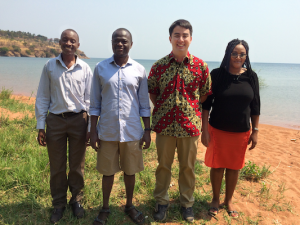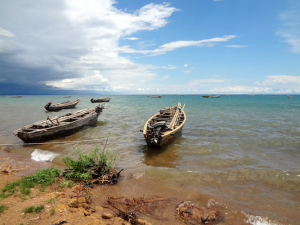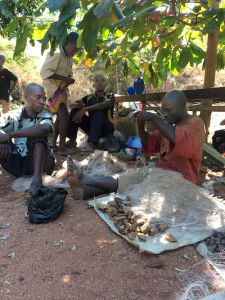By Patrick Farrar
Four outstanding graduate students in UF’s School of Natural Resources and Environment have received the prestigious Graduate Research Fellowship Program awards from the National Science Foundation. The highly-competitive five-year fellowship grants them substantial financial support for their research and education. The SNRE recipients are: Lake Tanganyika
- Nick Gengler
- Maggie Jones
- Ben Lowe
- Adam Searles
This series of blog posts serves to highlight these four students and their research interests.
“It was a game-changer when I got the NSF fellowship. I’m really grateful for it,” Ben Lowe said, reflecting on the competitive award that will fund his graduate studies.
As the son of a Christian pastor and a born naturalist who grew up exploring pockets of forest in Singapore, Ben was exposed to religion and nature early in life. His future interdisciplinary work would reflect that influence.
Ben worked with nonprofit organizations to mobilize Christians in the fight against climate change and environmental problems. He did that for ten years before coming back to graduate school. He felt compelled to confront these problems and be a part of their solutions, which is often a task that requires interdisciplinary know-how.
Graduate School
In Ben’s eyes, most graduate school tracks required too narrow of a focus for his goals, but the Interdisciplinary Ecology doctoral program in SNRE gave him the unique flexibility he wanted.

“It was the only way I could envision coming back and doing a Ph.D.,” he said.
Ben harnesses that flexibility to study the wide-ranging topics of conservation biology, fisheries management, religion, and social sciences. He synthesizes these topics compellingly in his dissertation research consisting of two distinct projects.
One involves fishing communities on Lake Tanganyika in eastern Africa, trying to understand how they perceive and adapt to climate-driven declines in their catch. His reasons for choosing this lake and the surrounding communities were manifold.

The lake is the second-largest and deepest in the world behind Lake Baikal in Siberia. It has the reputation of a global “biodiversity hotspot” with hundreds of unique fish species to conserve. Also, scientists have shown that climate change is affecting the communities there, and those communities have contributed very little to causing the problem. Therefore, his project concerns the wellbeing of fish and people, demonstrably connected.
Ben wants to figure out how to reconcile development goals with conservation goals in this region. Unless they are brought together in the same framework, the two types of goals can often be viewed as competing with one another.
“Which we know, in the long term, just doesn’t work,” he said.
Religion

He also realized through surveys and interviews with local fishermen that religion and spirituality had a big influence on how they viewed natural resources and their place in nature. This unexpected finding culminated in a published paper on the role of religion in fisheries management. He has also published a paper on how these communities are adapting to reductions in their catch.
Exposure to religious influence on environmental challenges in his work leading up to graduate school and in his work on Lake Tanganyika inspired the other main project of his dissertation. He studies how Christians in the United States, the largest religious group within the country and in the world, grapple with climate change and biodiversity loss.
By surveying Christian college students, he investigates if there are any generational differences in attitudes about, and engagement with, these two major human-caused environmental crises. His early results suggest that these young students perceive themselves as much more engaged with these issues than their parents.
In closing, Ben offered simple but profound insight into the relationship between us and the natural world.
“I love fish. I don’t know why, I can’t explain it, but I love all things fish,” he said. “But at the end of the day, if I really care about protecting or conserving fish, then I also have to understand and work with people.”
 0
0
